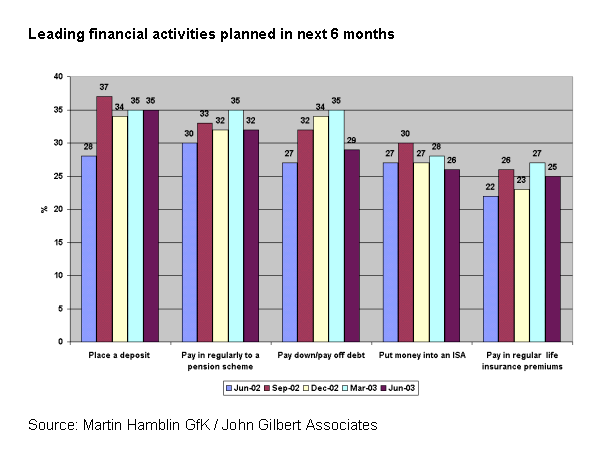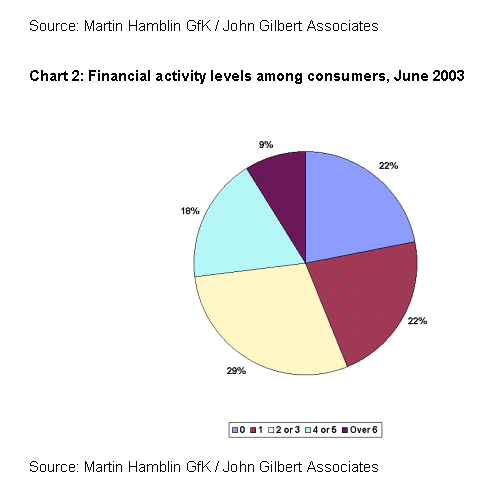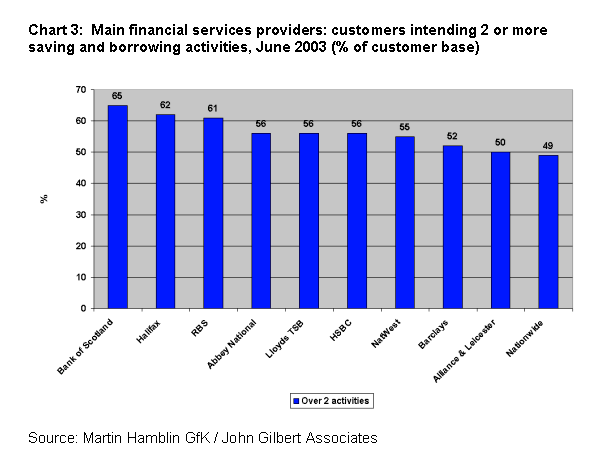UK Consumers Financially Becalmed
July 25 2003
The latest quarterly Financial Activity Bulletin produced by Martin Hamblin GfK and John Gilbert Associates shows consumers' appetite for savings and borrowing fell in June despite an 8-point rise in consumer confidence since March.
Including debt repayment intentions, the index of overall financial activity among the adult population aged 16+ fell from 81% in March to 78% in June 2003. Compared with March, expected savings and debt activity declined most among young people and low-income earners. By gender there is a much greater drop in savings and borrowing activity among women, down from 82% to 76%, than among men, down from 82% to 80%.
Other findings from the detailed survey include:
- Fewer people intend to make regular pension contributions - 32% of adults compared with 35% in March. Among part-time workers the fall was 6 percentage points.
- Depositing cash remains the favourite saving activity - 35% of consumers intend to put cash in the bank, a building society or National Savings, the same proportion as in March.
- The strong rally in the stock market between April and June is reflected in a slight improvement in investor sentiment, with planned purchases of shares and unit trusts up from 10% to 11%. Expected demand is greatest in the AB socio-economic group, up to 15% from 10% in March.
- The proportion of people expecting to take out a regular savings plan slipped to 12%, the lowest since last June.
- Intentions to borrow by way of plastic card, personal loan, overdraft or car financing plan all were down on March, with the overall demand for consumer credit falling from 17% of adults in March to 12% in June. Among women the figure fell from 25% in both March 2003 and December 2002 to 18% in June 2003.
- The prospects for mortgage lenders and the housing market look brighter. The proportion of people intending to put down a deposit who are currently renting and 'other' - probably living at home - increased from 9% in March to 13% in June suggesting that more first time buyers may be sitting in the wings ready to re-enter the housing market.
- A far smaller proportion of younger people (aged 16-29) intend to repay debt, down from 52% in March to 39% in June. Many may be simply deferring repayment until an improvement in their fortunes.

At present, 23-39 year olds and higher income earners look like generating the most business for financial services companies. Confidence appears to be polarising with a confidence score down 7 points among the 22% of the population not intending to save or borrow, compared to the 'very active' with a confidence score of +2 and the 'highly active' (6 or more activities) with a confidence score of +4. The chart below shows the number of activities planned by consumers in the next quarter.

Bank of Scotland (+4) and Royal Bank of Scotland (+3) have the most confident customers among the leading main financial services providers. This results in greater expected customer saving and borrowing activity: Bank of Scotland (86%) and Royal Bank of Scotland (82%) have the most active customer bases.

Commenting on the findings of the report John Gilbert said: 'Increasingly consumers appear to be calmed as the low interest rate, low inflation and low growth environment continues. A rising stock market will help investor confidence and together with a steady housing market will give a boost to the City and higher income earners. However, the general decrease in expected financial activity, especially in consumer credit, suggests that budgets are being squeezed, credit may be harder to obtain and the tough business conditions are forcing the flexible, private-sector workforce to cut back both spending and saving'.
The Financial Activity Bulletin is produced every January, April, July and October. It relates consumer confidence to financial activity and tracks this against expected savings, investment and borrowing activity over the next 6 months. It also tracks activity and confidence among the customers of major financial providers.
Interviewing for this wave was conducted from 29th May to 17th June 2003 amongst a sample of 2001 individuals aged 16+, identified from the monthly Martin Hamblin GfK consumer confidence survey omnibus carried out on behalf of the European Commission. Quotas were imposed on age, sex, region, social class and income to ensure the final sample was representative of the UK population.
All articles 2006-23 written and edited by Mel Crowther and/or Nick Thomas unless otherwise stated.


